Business Law Assignment: Malaysian Contract Law Analysis
VerifiedAdded on 2022/09/01
|10
|2466
|16
Essay
AI Summary
This essay provides a detailed analysis of Malaysian Contract Law, focusing on the essential requirements for a valid contract. It begins with an introduction to the significance of contracts in everyday life and the governing legislation, namely the Malaysian Contract Act 1950. The essay then defines a contract and discusses the six key requirements: offer, acceptance, consideration, intention to create legal relations, capacity, and free consent. A significant portion of the essay is dedicated to the concept of consideration, exploring its importance and exceptions as outlined in Section 26 of the Act. Landmark cases are cited to illustrate the application of these principles. The paper concludes by emphasizing the critical role of contracts in business and personal transactions and the importance of understanding the elements that make a contract legally binding, including the impact of consideration and how it relates to the validity of the contract.
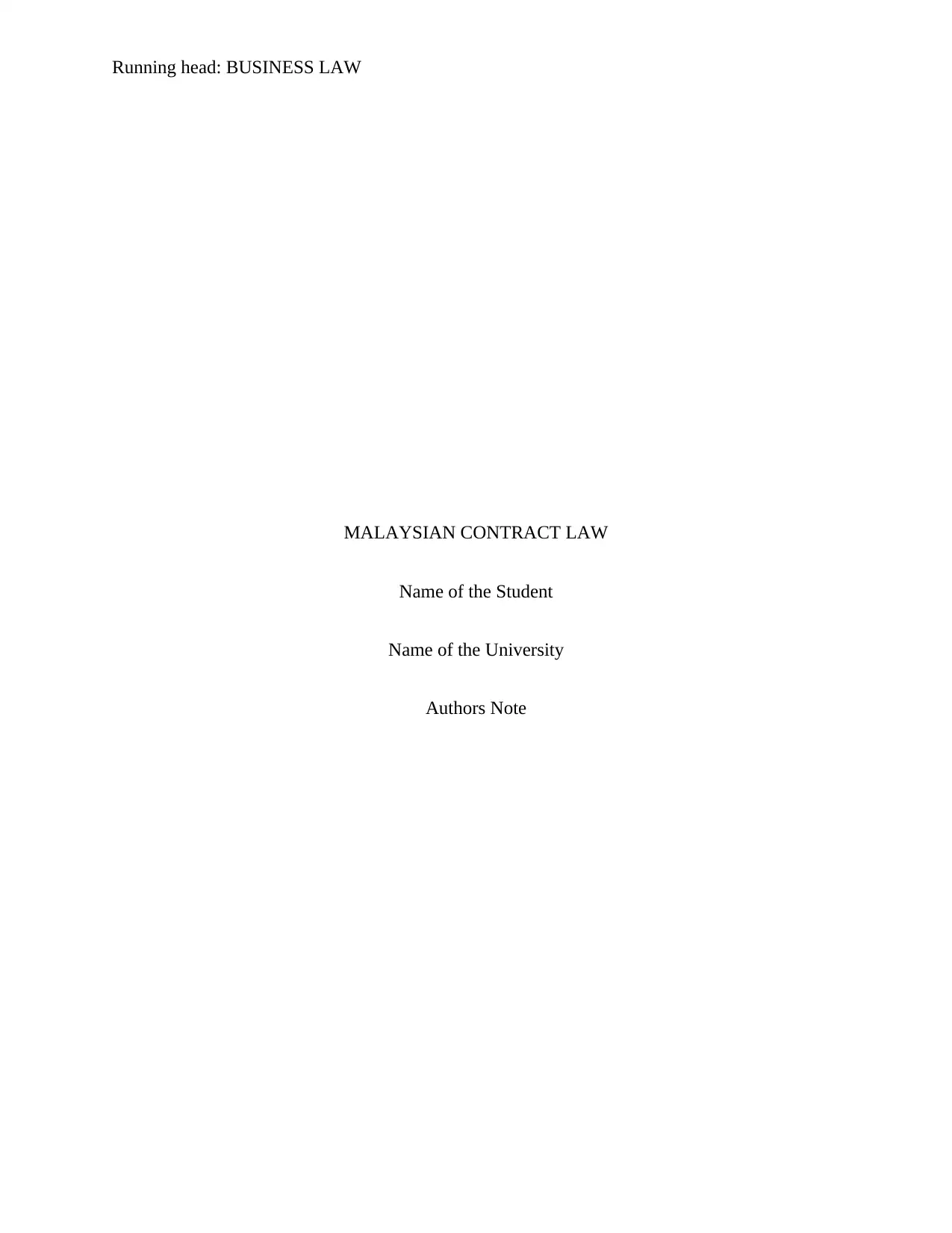
Running head: BUSINESS LAW
MALAYSIAN CONTRACT LAW
Name of the Student
Name of the University
Authors Note
MALAYSIAN CONTRACT LAW
Name of the Student
Name of the University
Authors Note
Paraphrase This Document
Need a fresh take? Get an instant paraphrase of this document with our AI Paraphraser
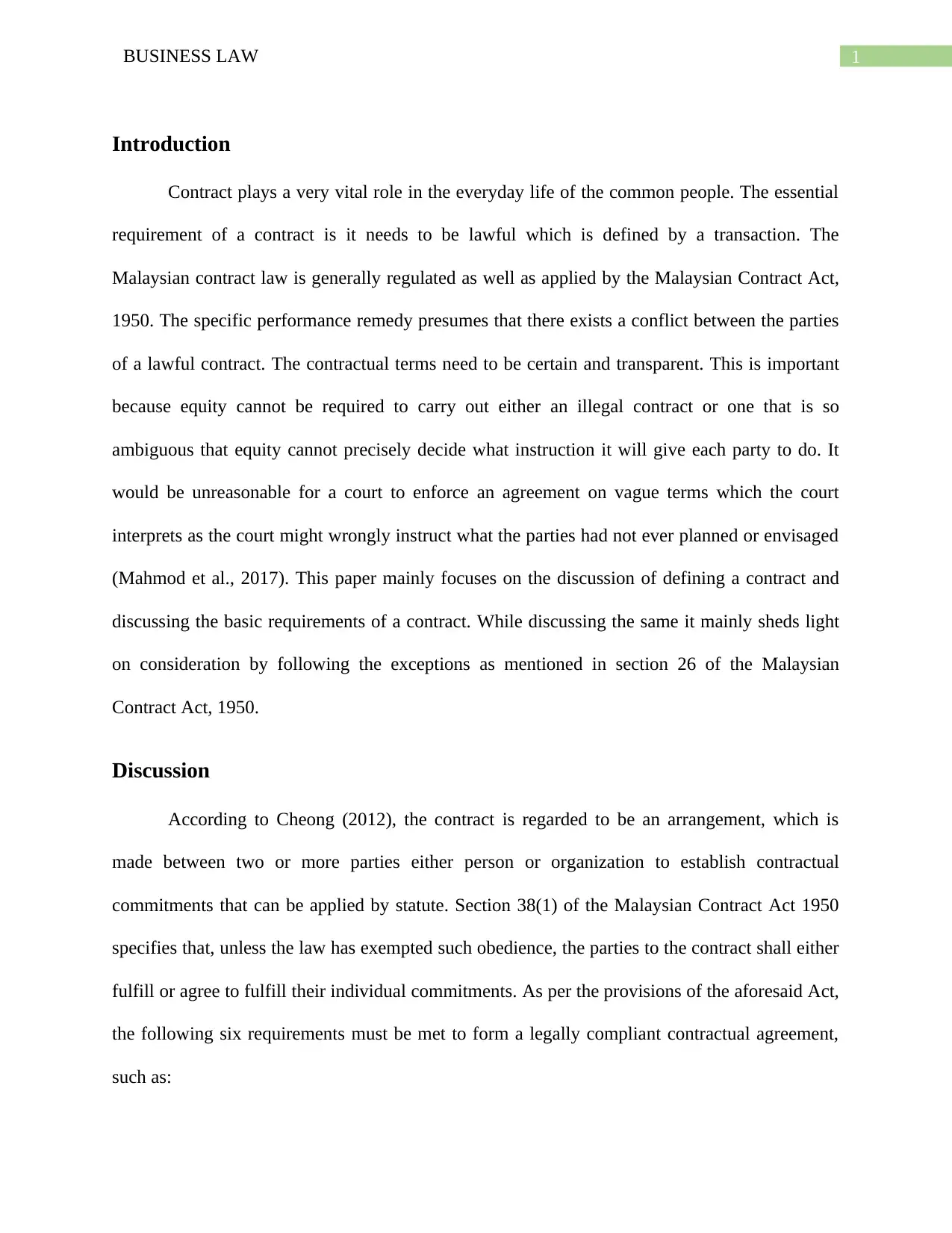
1BUSINESS LAW
Introduction
Contract plays a very vital role in the everyday life of the common people. The essential
requirement of a contract is it needs to be lawful which is defined by a transaction. The
Malaysian contract law is generally regulated as well as applied by the Malaysian Contract Act,
1950. The specific performance remedy presumes that there exists a conflict between the parties
of a lawful contract. The contractual terms need to be certain and transparent. This is important
because equity cannot be required to carry out either an illegal contract or one that is so
ambiguous that equity cannot precisely decide what instruction it will give each party to do. It
would be unreasonable for a court to enforce an agreement on vague terms which the court
interprets as the court might wrongly instruct what the parties had not ever planned or envisaged
(Mahmod et al., 2017). This paper mainly focuses on the discussion of defining a contract and
discussing the basic requirements of a contract. While discussing the same it mainly sheds light
on consideration by following the exceptions as mentioned in section 26 of the Malaysian
Contract Act, 1950.
Discussion
According to Cheong (2012), the contract is regarded to be an arrangement, which is
made between two or more parties either person or organization to establish contractual
commitments that can be applied by statute. Section 38(1) of the Malaysian Contract Act 1950
specifies that, unless the law has exempted such obedience, the parties to the contract shall either
fulfill or agree to fulfill their individual commitments. As per the provisions of the aforesaid Act,
the following six requirements must be met to form a legally compliant contractual agreement,
such as:
Introduction
Contract plays a very vital role in the everyday life of the common people. The essential
requirement of a contract is it needs to be lawful which is defined by a transaction. The
Malaysian contract law is generally regulated as well as applied by the Malaysian Contract Act,
1950. The specific performance remedy presumes that there exists a conflict between the parties
of a lawful contract. The contractual terms need to be certain and transparent. This is important
because equity cannot be required to carry out either an illegal contract or one that is so
ambiguous that equity cannot precisely decide what instruction it will give each party to do. It
would be unreasonable for a court to enforce an agreement on vague terms which the court
interprets as the court might wrongly instruct what the parties had not ever planned or envisaged
(Mahmod et al., 2017). This paper mainly focuses on the discussion of defining a contract and
discussing the basic requirements of a contract. While discussing the same it mainly sheds light
on consideration by following the exceptions as mentioned in section 26 of the Malaysian
Contract Act, 1950.
Discussion
According to Cheong (2012), the contract is regarded to be an arrangement, which is
made between two or more parties either person or organization to establish contractual
commitments that can be applied by statute. Section 38(1) of the Malaysian Contract Act 1950
specifies that, unless the law has exempted such obedience, the parties to the contract shall either
fulfill or agree to fulfill their individual commitments. As per the provisions of the aforesaid Act,
the following six requirements must be met to form a legally compliant contractual agreement,
such as:
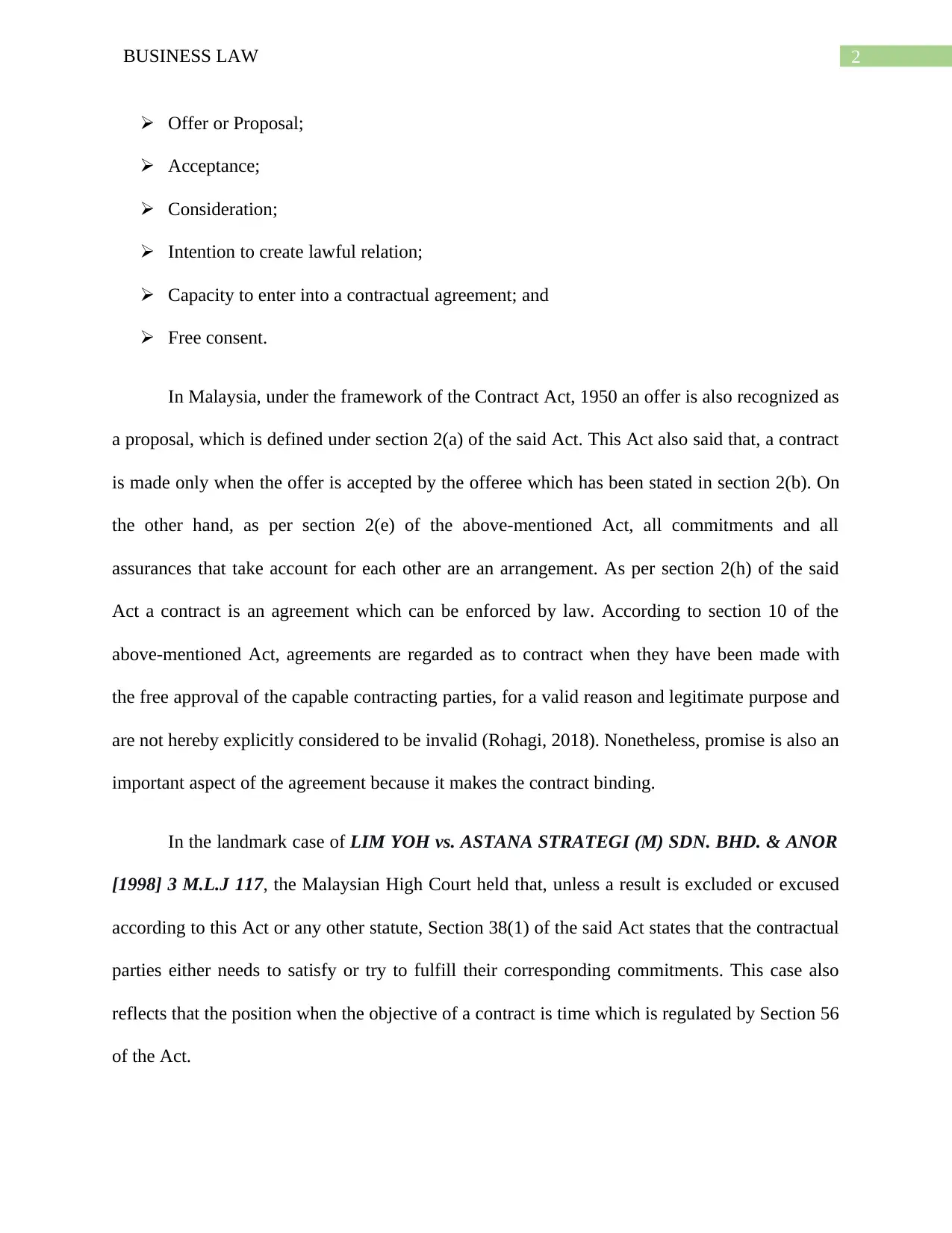
2BUSINESS LAW
Offer or Proposal;
Acceptance;
Consideration;
Intention to create lawful relation;
Capacity to enter into a contractual agreement; and
Free consent.
In Malaysia, under the framework of the Contract Act, 1950 an offer is also recognized as
a proposal, which is defined under section 2(a) of the said Act. This Act also said that, a contract
is made only when the offer is accepted by the offeree which has been stated in section 2(b). On
the other hand, as per section 2(e) of the above-mentioned Act, all commitments and all
assurances that take account for each other are an arrangement. As per section 2(h) of the said
Act a contract is an agreement which can be enforced by law. According to section 10 of the
above-mentioned Act, agreements are regarded as to contract when they have been made with
the free approval of the capable contracting parties, for a valid reason and legitimate purpose and
are not hereby explicitly considered to be invalid (Rohagi, 2018). Nonetheless, promise is also an
important aspect of the agreement because it makes the contract binding.
In the landmark case of LIM YOH vs. ASTANA STRATEGI (M) SDN. BHD. & ANOR
[1998] 3 M.L.J 117, the Malaysian High Court held that, unless a result is excluded or excused
according to this Act or any other statute, Section 38(1) of the said Act states that the contractual
parties either needs to satisfy or try to fulfill their corresponding commitments. This case also
reflects that the position when the objective of a contract is time which is regulated by Section 56
of the Act.
Offer or Proposal;
Acceptance;
Consideration;
Intention to create lawful relation;
Capacity to enter into a contractual agreement; and
Free consent.
In Malaysia, under the framework of the Contract Act, 1950 an offer is also recognized as
a proposal, which is defined under section 2(a) of the said Act. This Act also said that, a contract
is made only when the offer is accepted by the offeree which has been stated in section 2(b). On
the other hand, as per section 2(e) of the above-mentioned Act, all commitments and all
assurances that take account for each other are an arrangement. As per section 2(h) of the said
Act a contract is an agreement which can be enforced by law. According to section 10 of the
above-mentioned Act, agreements are regarded as to contract when they have been made with
the free approval of the capable contracting parties, for a valid reason and legitimate purpose and
are not hereby explicitly considered to be invalid (Rohagi, 2018). Nonetheless, promise is also an
important aspect of the agreement because it makes the contract binding.
In the landmark case of LIM YOH vs. ASTANA STRATEGI (M) SDN. BHD. & ANOR
[1998] 3 M.L.J 117, the Malaysian High Court held that, unless a result is excluded or excused
according to this Act or any other statute, Section 38(1) of the said Act states that the contractual
parties either needs to satisfy or try to fulfill their corresponding commitments. This case also
reflects that the position when the objective of a contract is time which is regulated by Section 56
of the Act.
⊘ This is a preview!⊘
Do you want full access?
Subscribe today to unlock all pages.

Trusted by 1+ million students worldwide
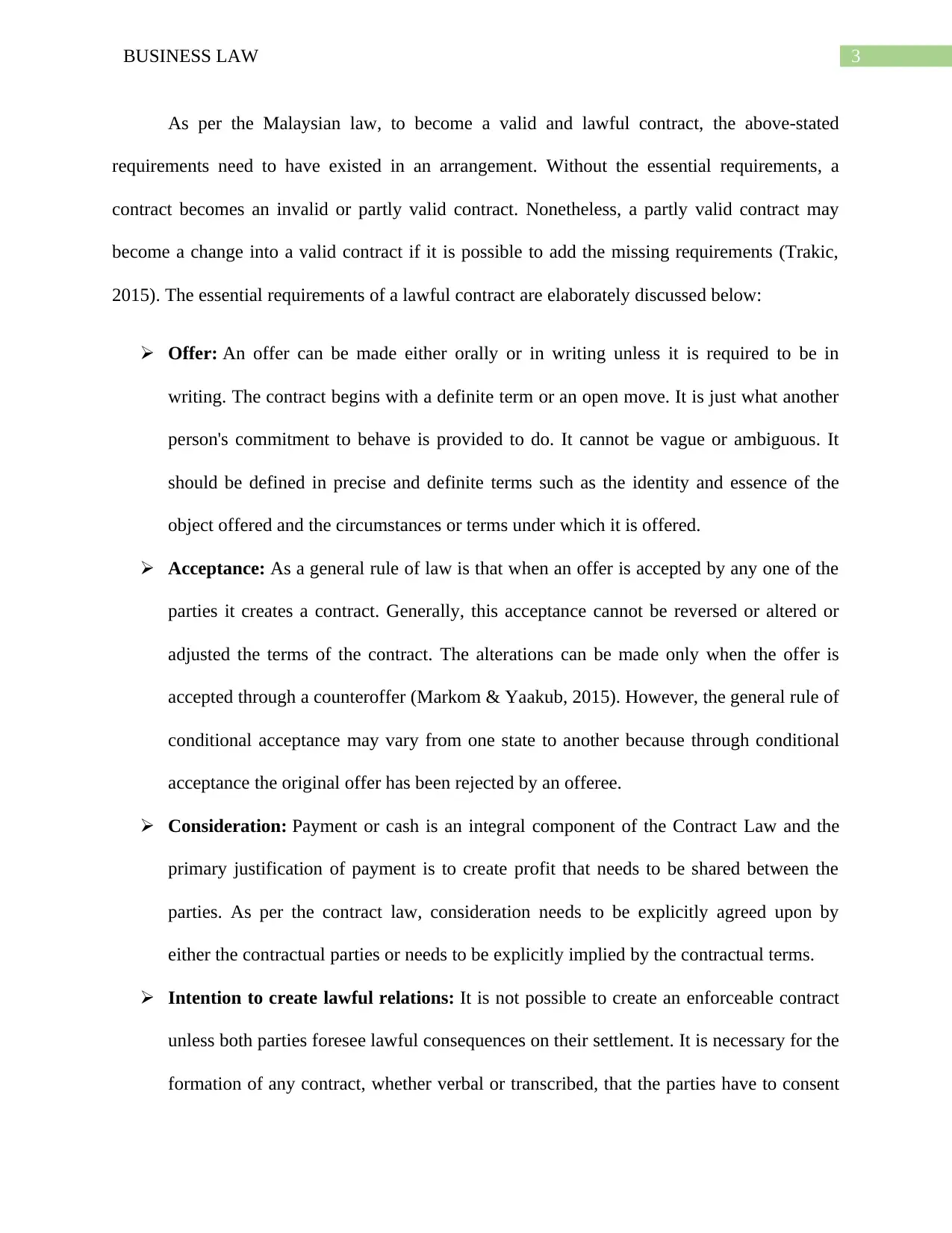
3BUSINESS LAW
As per the Malaysian law, to become a valid and lawful contract, the above-stated
requirements need to have existed in an arrangement. Without the essential requirements, a
contract becomes an invalid or partly valid contract. Nonetheless, a partly valid contract may
become a change into a valid contract if it is possible to add the missing requirements (Trakic,
2015). The essential requirements of a lawful contract are elaborately discussed below:
Offer: An offer can be made either orally or in writing unless it is required to be in
writing. The contract begins with a definite term or an open move. It is just what another
person's commitment to behave is provided to do. It cannot be vague or ambiguous. It
should be defined in precise and definite terms such as the identity and essence of the
object offered and the circumstances or terms under which it is offered.
Acceptance: As a general rule of law is that when an offer is accepted by any one of the
parties it creates a contract. Generally, this acceptance cannot be reversed or altered or
adjusted the terms of the contract. The alterations can be made only when the offer is
accepted through a counteroffer (Markom & Yaakub, 2015). However, the general rule of
conditional acceptance may vary from one state to another because through conditional
acceptance the original offer has been rejected by an offeree.
Consideration: Payment or cash is an integral component of the Contract Law and the
primary justification of payment is to create profit that needs to be shared between the
parties. As per the contract law, consideration needs to be explicitly agreed upon by
either the contractual parties or needs to be explicitly implied by the contractual terms.
Intention to create lawful relations: It is not possible to create an enforceable contract
unless both parties foresee lawful consequences on their settlement. It is necessary for the
formation of any contract, whether verbal or transcribed, that the parties have to consent
As per the Malaysian law, to become a valid and lawful contract, the above-stated
requirements need to have existed in an arrangement. Without the essential requirements, a
contract becomes an invalid or partly valid contract. Nonetheless, a partly valid contract may
become a change into a valid contract if it is possible to add the missing requirements (Trakic,
2015). The essential requirements of a lawful contract are elaborately discussed below:
Offer: An offer can be made either orally or in writing unless it is required to be in
writing. The contract begins with a definite term or an open move. It is just what another
person's commitment to behave is provided to do. It cannot be vague or ambiguous. It
should be defined in precise and definite terms such as the identity and essence of the
object offered and the circumstances or terms under which it is offered.
Acceptance: As a general rule of law is that when an offer is accepted by any one of the
parties it creates a contract. Generally, this acceptance cannot be reversed or altered or
adjusted the terms of the contract. The alterations can be made only when the offer is
accepted through a counteroffer (Markom & Yaakub, 2015). However, the general rule of
conditional acceptance may vary from one state to another because through conditional
acceptance the original offer has been rejected by an offeree.
Consideration: Payment or cash is an integral component of the Contract Law and the
primary justification of payment is to create profit that needs to be shared between the
parties. As per the contract law, consideration needs to be explicitly agreed upon by
either the contractual parties or needs to be explicitly implied by the contractual terms.
Intention to create lawful relations: It is not possible to create an enforceable contract
unless both parties foresee lawful consequences on their settlement. It is necessary for the
formation of any contract, whether verbal or transcribed, that the parties have to consent
Paraphrase This Document
Need a fresh take? Get an instant paraphrase of this document with our AI Paraphraser
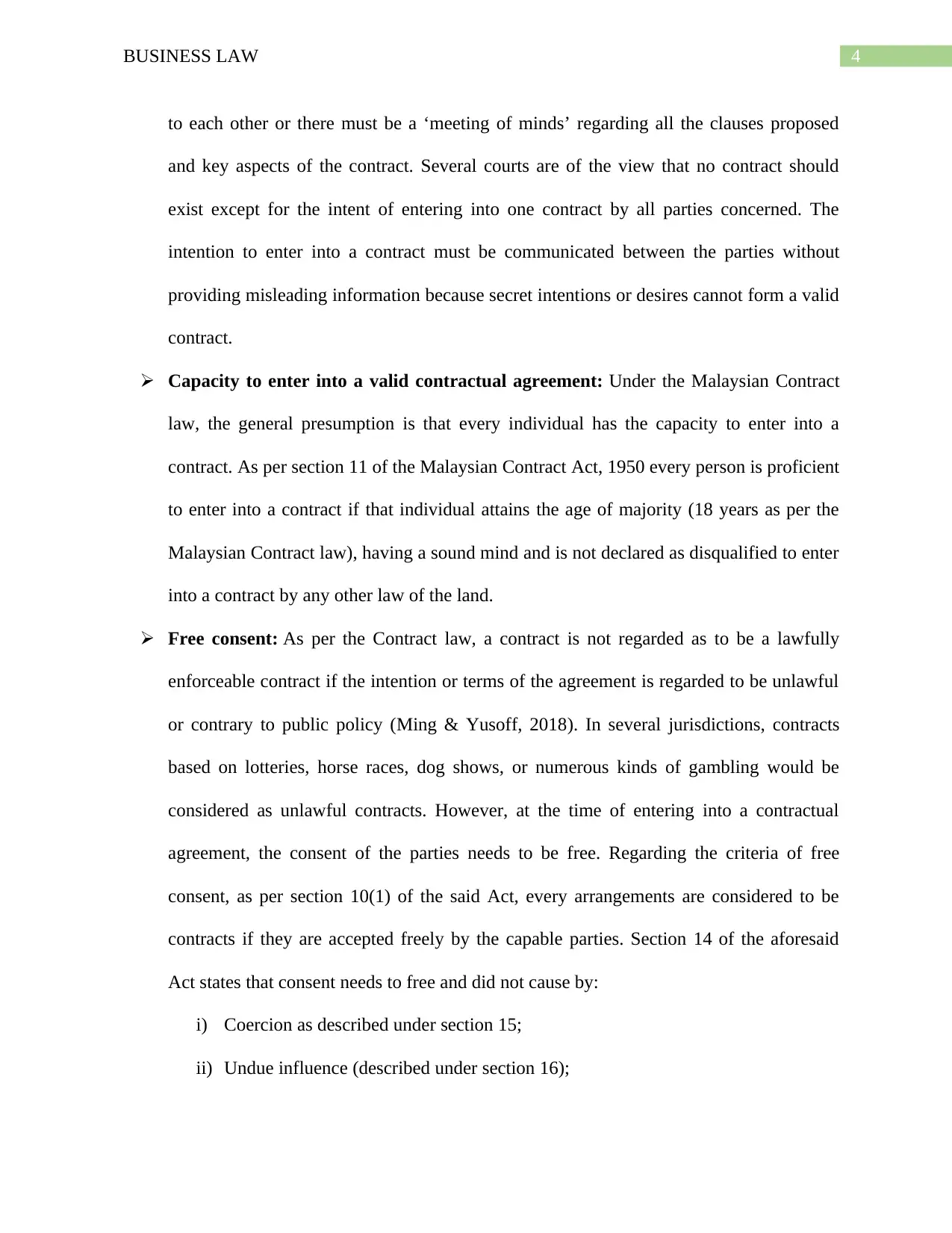
4BUSINESS LAW
to each other or there must be a ‘meeting of minds’ regarding all the clauses proposed
and key aspects of the contract. Several courts are of the view that no contract should
exist except for the intent of entering into one contract by all parties concerned. The
intention to enter into a contract must be communicated between the parties without
providing misleading information because secret intentions or desires cannot form a valid
contract.
Capacity to enter into a valid contractual agreement: Under the Malaysian Contract
law, the general presumption is that every individual has the capacity to enter into a
contract. As per section 11 of the Malaysian Contract Act, 1950 every person is proficient
to enter into a contract if that individual attains the age of majority (18 years as per the
Malaysian Contract law), having a sound mind and is not declared as disqualified to enter
into a contract by any other law of the land.
Free consent: As per the Contract law, a contract is not regarded as to be a lawfully
enforceable contract if the intention or terms of the agreement is regarded to be unlawful
or contrary to public policy (Ming & Yusoff, 2018). In several jurisdictions, contracts
based on lotteries, horse races, dog shows, or numerous kinds of gambling would be
considered as unlawful contracts. However, at the time of entering into a contractual
agreement, the consent of the parties needs to be free. Regarding the criteria of free
consent, as per section 10(1) of the said Act, every arrangements are considered to be
contracts if they are accepted freely by the capable parties. Section 14 of the aforesaid
Act states that consent needs to free and did not cause by:
i) Coercion as described under section 15;
ii) Undue influence (described under section 16);
to each other or there must be a ‘meeting of minds’ regarding all the clauses proposed
and key aspects of the contract. Several courts are of the view that no contract should
exist except for the intent of entering into one contract by all parties concerned. The
intention to enter into a contract must be communicated between the parties without
providing misleading information because secret intentions or desires cannot form a valid
contract.
Capacity to enter into a valid contractual agreement: Under the Malaysian Contract
law, the general presumption is that every individual has the capacity to enter into a
contract. As per section 11 of the Malaysian Contract Act, 1950 every person is proficient
to enter into a contract if that individual attains the age of majority (18 years as per the
Malaysian Contract law), having a sound mind and is not declared as disqualified to enter
into a contract by any other law of the land.
Free consent: As per the Contract law, a contract is not regarded as to be a lawfully
enforceable contract if the intention or terms of the agreement is regarded to be unlawful
or contrary to public policy (Ming & Yusoff, 2018). In several jurisdictions, contracts
based on lotteries, horse races, dog shows, or numerous kinds of gambling would be
considered as unlawful contracts. However, at the time of entering into a contractual
agreement, the consent of the parties needs to be free. Regarding the criteria of free
consent, as per section 10(1) of the said Act, every arrangements are considered to be
contracts if they are accepted freely by the capable parties. Section 14 of the aforesaid
Act states that consent needs to free and did not cause by:
i) Coercion as described under section 15;
ii) Undue influence (described under section 16);
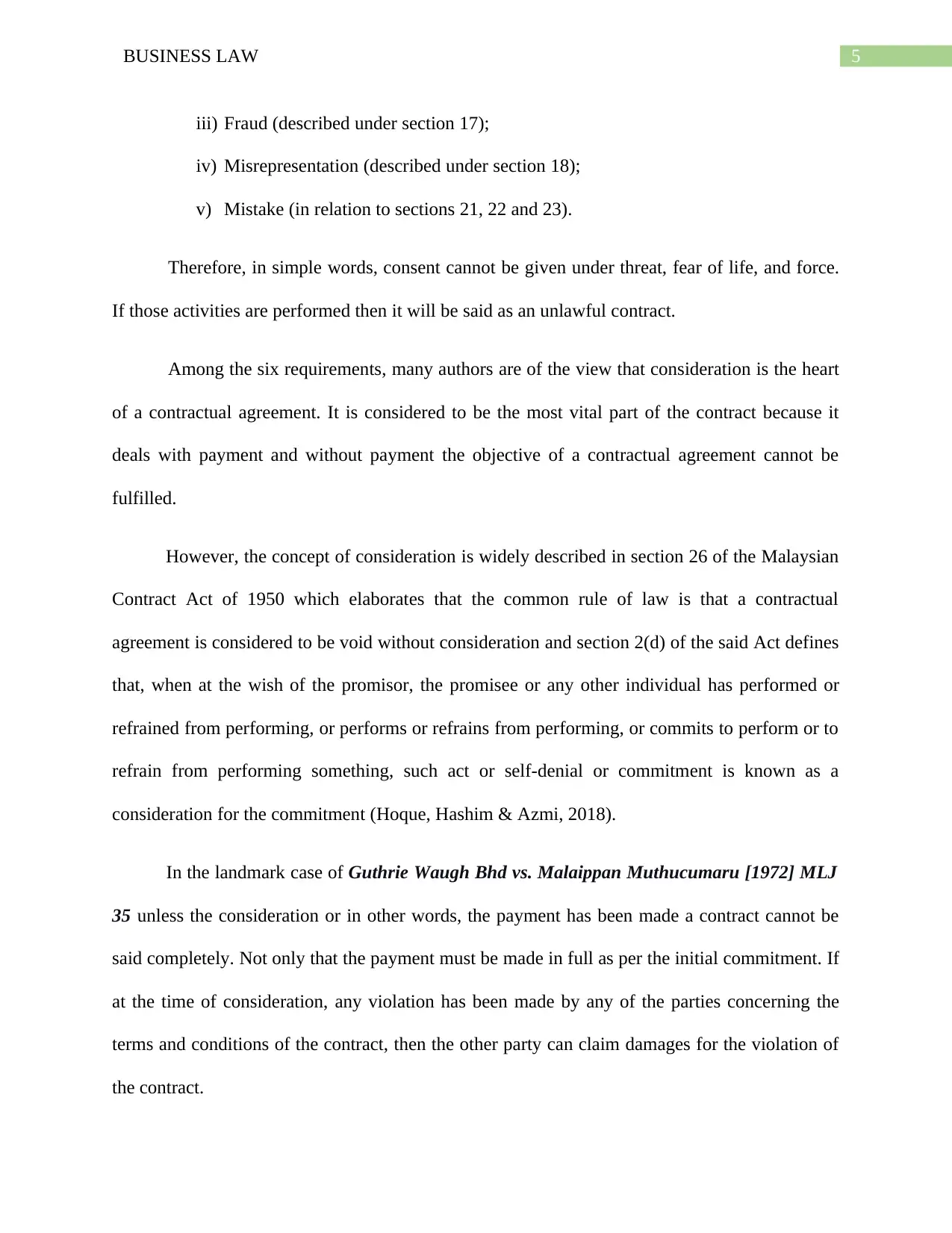
5BUSINESS LAW
iii) Fraud (described under section 17);
iv) Misrepresentation (described under section 18);
v) Mistake (in relation to sections 21, 22 and 23).
Therefore, in simple words, consent cannot be given under threat, fear of life, and force.
If those activities are performed then it will be said as an unlawful contract.
Among the six requirements, many authors are of the view that consideration is the heart
of a contractual agreement. It is considered to be the most vital part of the contract because it
deals with payment and without payment the objective of a contractual agreement cannot be
fulfilled.
However, the concept of consideration is widely described in section 26 of the Malaysian
Contract Act of 1950 which elaborates that the common rule of law is that a contractual
agreement is considered to be void without consideration and section 2(d) of the said Act defines
that, when at the wish of the promisor, the promisee or any other individual has performed or
refrained from performing, or performs or refrains from performing, or commits to perform or to
refrain from performing something, such act or self-denial or commitment is known as a
consideration for the commitment (Hoque, Hashim & Azmi, 2018).
In the landmark case of Guthrie Waugh Bhd vs. Malaippan Muthucumaru [1972] MLJ
35 unless the consideration or in other words, the payment has been made a contract cannot be
said completely. Not only that the payment must be made in full as per the initial commitment. If
at the time of consideration, any violation has been made by any of the parties concerning the
terms and conditions of the contract, then the other party can claim damages for the violation of
the contract.
iii) Fraud (described under section 17);
iv) Misrepresentation (described under section 18);
v) Mistake (in relation to sections 21, 22 and 23).
Therefore, in simple words, consent cannot be given under threat, fear of life, and force.
If those activities are performed then it will be said as an unlawful contract.
Among the six requirements, many authors are of the view that consideration is the heart
of a contractual agreement. It is considered to be the most vital part of the contract because it
deals with payment and without payment the objective of a contractual agreement cannot be
fulfilled.
However, the concept of consideration is widely described in section 26 of the Malaysian
Contract Act of 1950 which elaborates that the common rule of law is that a contractual
agreement is considered to be void without consideration and section 2(d) of the said Act defines
that, when at the wish of the promisor, the promisee or any other individual has performed or
refrained from performing, or performs or refrains from performing, or commits to perform or to
refrain from performing something, such act or self-denial or commitment is known as a
consideration for the commitment (Hoque, Hashim & Azmi, 2018).
In the landmark case of Guthrie Waugh Bhd vs. Malaippan Muthucumaru [1972] MLJ
35 unless the consideration or in other words, the payment has been made a contract cannot be
said completely. Not only that the payment must be made in full as per the initial commitment. If
at the time of consideration, any violation has been made by any of the parties concerning the
terms and conditions of the contract, then the other party can claim damages for the violation of
the contract.
⊘ This is a preview!⊘
Do you want full access?
Subscribe today to unlock all pages.

Trusted by 1+ million students worldwide
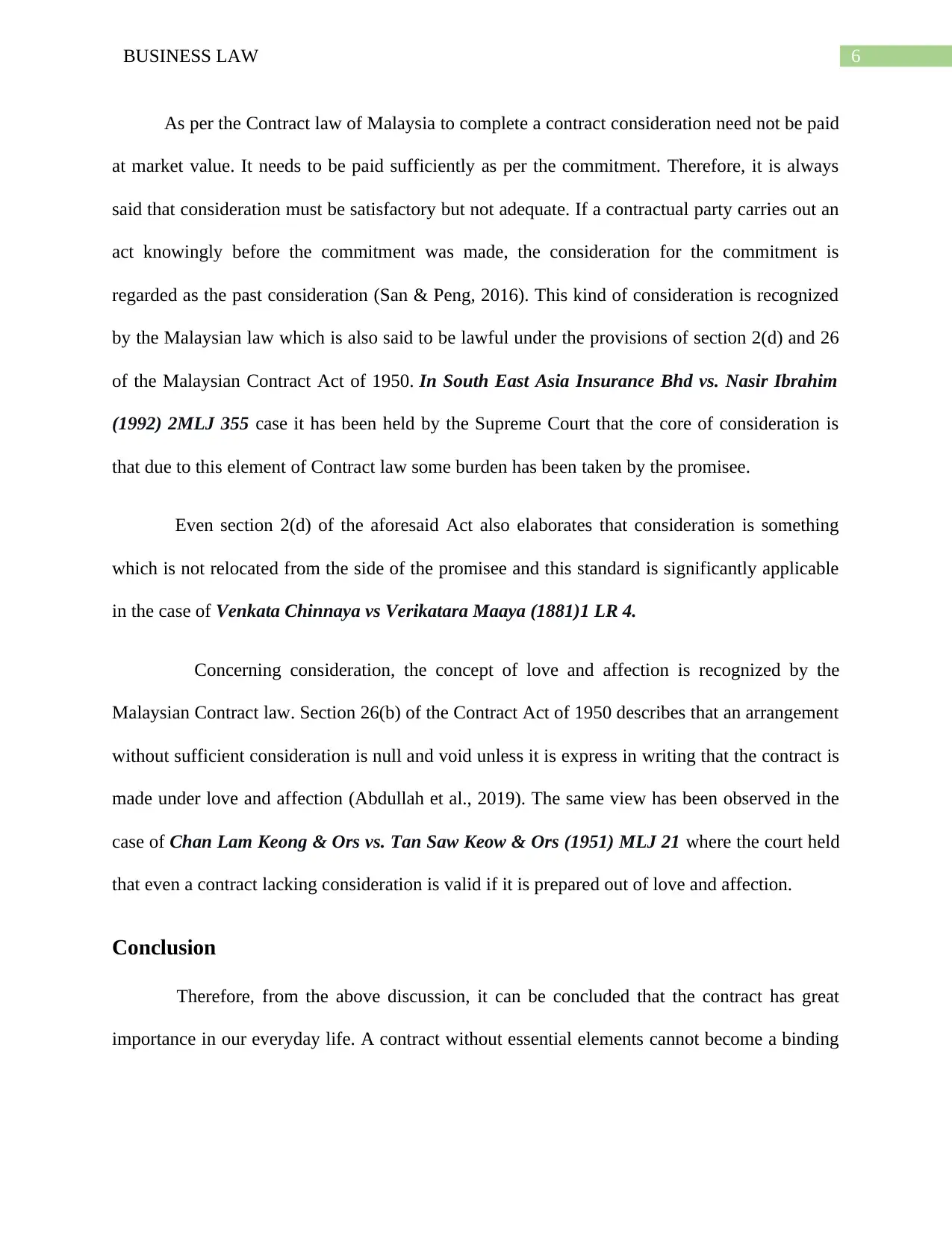
6BUSINESS LAW
As per the Contract law of Malaysia to complete a contract consideration need not be paid
at market value. It needs to be paid sufficiently as per the commitment. Therefore, it is always
said that consideration must be satisfactory but not adequate. If a contractual party carries out an
act knowingly before the commitment was made, the consideration for the commitment is
regarded as the past consideration (San & Peng, 2016). This kind of consideration is recognized
by the Malaysian law which is also said to be lawful under the provisions of section 2(d) and 26
of the Malaysian Contract Act of 1950. In South East Asia Insurance Bhd vs. Nasir Ibrahim
(1992) 2MLJ 355 case it has been held by the Supreme Court that the core of consideration is
that due to this element of Contract law some burden has been taken by the promisee.
Even section 2(d) of the aforesaid Act also elaborates that consideration is something
which is not relocated from the side of the promisee and this standard is significantly applicable
in the case of Venkata Chinnaya vs Verikatara Maaya (1881)1 LR 4.
Concerning consideration, the concept of love and affection is recognized by the
Malaysian Contract law. Section 26(b) of the Contract Act of 1950 describes that an arrangement
without sufficient consideration is null and void unless it is express in writing that the contract is
made under love and affection (Abdullah et al., 2019). The same view has been observed in the
case of Chan Lam Keong & Ors vs. Tan Saw Keow & Ors (1951) MLJ 21 where the court held
that even a contract lacking consideration is valid if it is prepared out of love and affection.
Conclusion
Therefore, from the above discussion, it can be concluded that the contract has great
importance in our everyday life. A contract without essential elements cannot become a binding
As per the Contract law of Malaysia to complete a contract consideration need not be paid
at market value. It needs to be paid sufficiently as per the commitment. Therefore, it is always
said that consideration must be satisfactory but not adequate. If a contractual party carries out an
act knowingly before the commitment was made, the consideration for the commitment is
regarded as the past consideration (San & Peng, 2016). This kind of consideration is recognized
by the Malaysian law which is also said to be lawful under the provisions of section 2(d) and 26
of the Malaysian Contract Act of 1950. In South East Asia Insurance Bhd vs. Nasir Ibrahim
(1992) 2MLJ 355 case it has been held by the Supreme Court that the core of consideration is
that due to this element of Contract law some burden has been taken by the promisee.
Even section 2(d) of the aforesaid Act also elaborates that consideration is something
which is not relocated from the side of the promisee and this standard is significantly applicable
in the case of Venkata Chinnaya vs Verikatara Maaya (1881)1 LR 4.
Concerning consideration, the concept of love and affection is recognized by the
Malaysian Contract law. Section 26(b) of the Contract Act of 1950 describes that an arrangement
without sufficient consideration is null and void unless it is express in writing that the contract is
made under love and affection (Abdullah et al., 2019). The same view has been observed in the
case of Chan Lam Keong & Ors vs. Tan Saw Keow & Ors (1951) MLJ 21 where the court held
that even a contract lacking consideration is valid if it is prepared out of love and affection.
Conclusion
Therefore, from the above discussion, it can be concluded that the contract has great
importance in our everyday life. A contract without essential elements cannot become a binding
Paraphrase This Document
Need a fresh take? Get an instant paraphrase of this document with our AI Paraphraser

7BUSINESS LAW
contract. Consideration is considered to be the most vital component of a contract. However, a
contract without consideration becomes a valid contract if it is made out of love and affection.
contract. Consideration is considered to be the most vital component of a contract. However, a
contract without consideration becomes a valid contract if it is made out of love and affection.
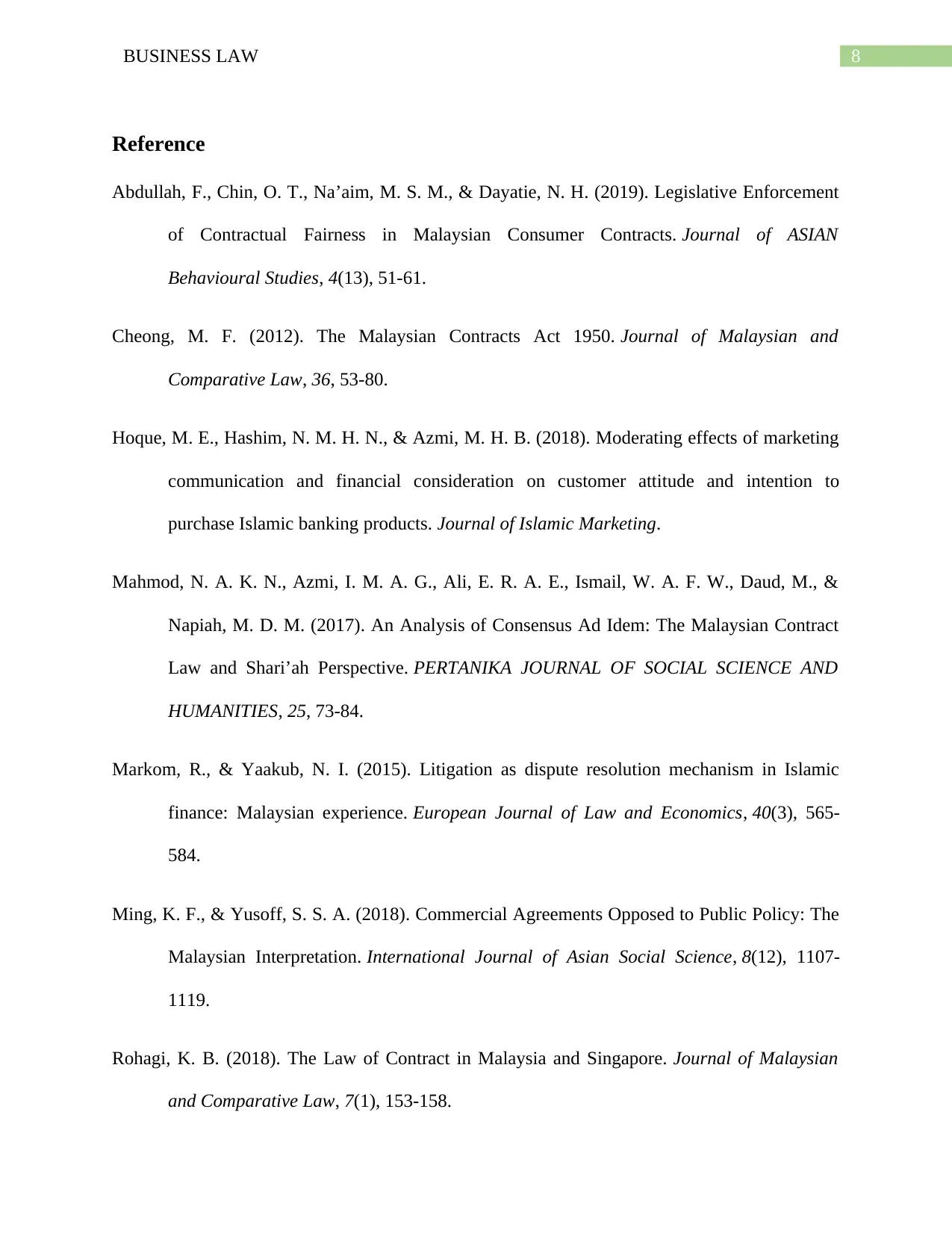
8BUSINESS LAW
Reference
Abdullah, F., Chin, O. T., Na’aim, M. S. M., & Dayatie, N. H. (2019). Legislative Enforcement
of Contractual Fairness in Malaysian Consumer Contracts. Journal of ASIAN
Behavioural Studies, 4(13), 51-61.
Cheong, M. F. (2012). The Malaysian Contracts Act 1950. Journal of Malaysian and
Comparative Law, 36, 53-80.
Hoque, M. E., Hashim, N. M. H. N., & Azmi, M. H. B. (2018). Moderating effects of marketing
communication and financial consideration on customer attitude and intention to
purchase Islamic banking products. Journal of Islamic Marketing.
Mahmod, N. A. K. N., Azmi, I. M. A. G., Ali, E. R. A. E., Ismail, W. A. F. W., Daud, M., &
Napiah, M. D. M. (2017). An Analysis of Consensus Ad Idem: The Malaysian Contract
Law and Shari’ah Perspective. PERTANIKA JOURNAL OF SOCIAL SCIENCE AND
HUMANITIES, 25, 73-84.
Markom, R., & Yaakub, N. I. (2015). Litigation as dispute resolution mechanism in Islamic
finance: Malaysian experience. European Journal of Law and Economics, 40(3), 565-
584.
Ming, K. F., & Yusoff, S. S. A. (2018). Commercial Agreements Opposed to Public Policy: The
Malaysian Interpretation. International Journal of Asian Social Science, 8(12), 1107-
1119.
Rohagi, K. B. (2018). The Law of Contract in Malaysia and Singapore. Journal of Malaysian
and Comparative Law, 7(1), 153-158.
Reference
Abdullah, F., Chin, O. T., Na’aim, M. S. M., & Dayatie, N. H. (2019). Legislative Enforcement
of Contractual Fairness in Malaysian Consumer Contracts. Journal of ASIAN
Behavioural Studies, 4(13), 51-61.
Cheong, M. F. (2012). The Malaysian Contracts Act 1950. Journal of Malaysian and
Comparative Law, 36, 53-80.
Hoque, M. E., Hashim, N. M. H. N., & Azmi, M. H. B. (2018). Moderating effects of marketing
communication and financial consideration on customer attitude and intention to
purchase Islamic banking products. Journal of Islamic Marketing.
Mahmod, N. A. K. N., Azmi, I. M. A. G., Ali, E. R. A. E., Ismail, W. A. F. W., Daud, M., &
Napiah, M. D. M. (2017). An Analysis of Consensus Ad Idem: The Malaysian Contract
Law and Shari’ah Perspective. PERTANIKA JOURNAL OF SOCIAL SCIENCE AND
HUMANITIES, 25, 73-84.
Markom, R., & Yaakub, N. I. (2015). Litigation as dispute resolution mechanism in Islamic
finance: Malaysian experience. European Journal of Law and Economics, 40(3), 565-
584.
Ming, K. F., & Yusoff, S. S. A. (2018). Commercial Agreements Opposed to Public Policy: The
Malaysian Interpretation. International Journal of Asian Social Science, 8(12), 1107-
1119.
Rohagi, K. B. (2018). The Law of Contract in Malaysia and Singapore. Journal of Malaysian
and Comparative Law, 7(1), 153-158.
⊘ This is a preview!⊘
Do you want full access?
Subscribe today to unlock all pages.

Trusted by 1+ million students worldwide
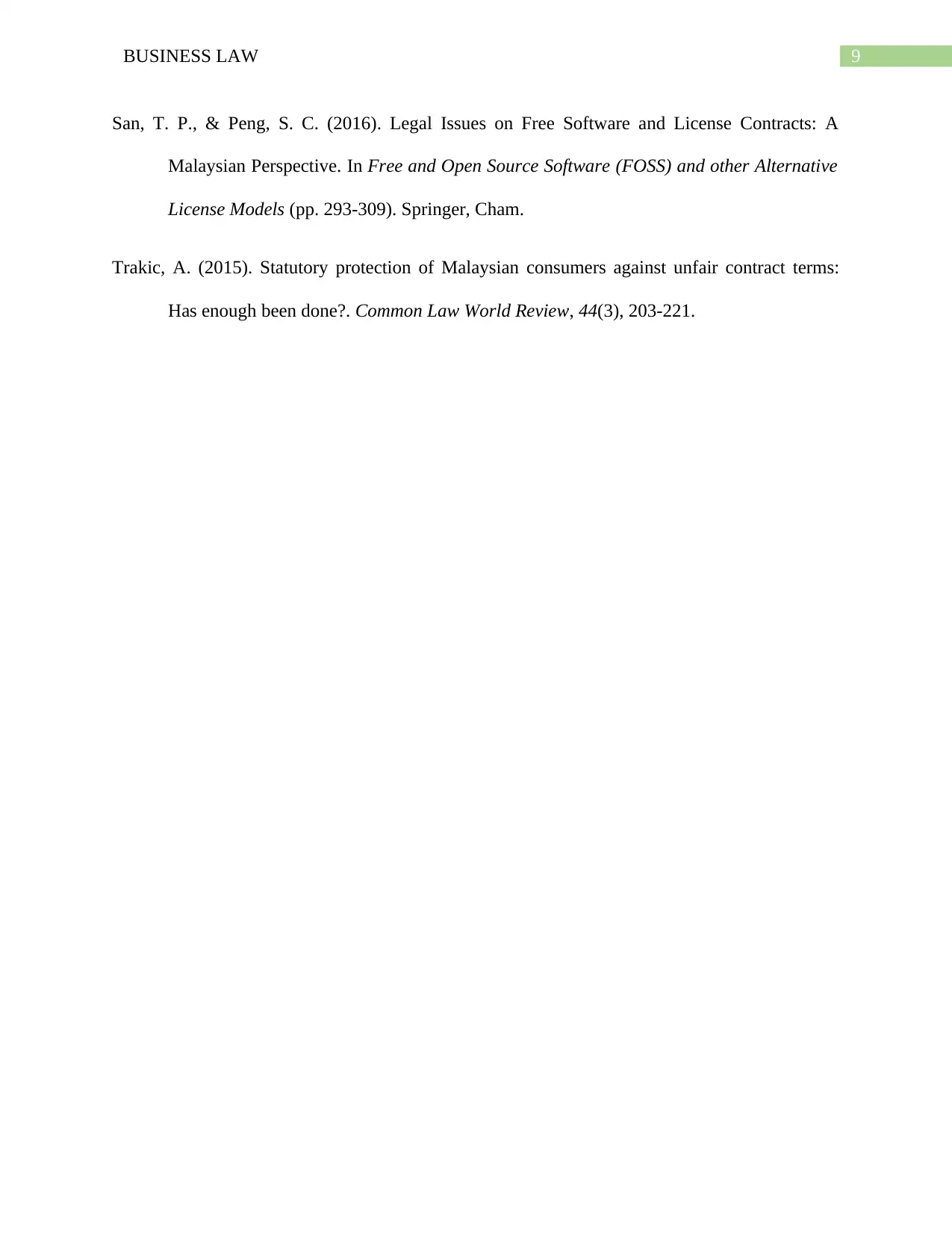
9BUSINESS LAW
San, T. P., & Peng, S. C. (2016). Legal Issues on Free Software and License Contracts: A
Malaysian Perspective. In Free and Open Source Software (FOSS) and other Alternative
License Models (pp. 293-309). Springer, Cham.
Trakic, A. (2015). Statutory protection of Malaysian consumers against unfair contract terms:
Has enough been done?. Common Law World Review, 44(3), 203-221.
San, T. P., & Peng, S. C. (2016). Legal Issues on Free Software and License Contracts: A
Malaysian Perspective. In Free and Open Source Software (FOSS) and other Alternative
License Models (pp. 293-309). Springer, Cham.
Trakic, A. (2015). Statutory protection of Malaysian consumers against unfair contract terms:
Has enough been done?. Common Law World Review, 44(3), 203-221.
1 out of 10
Related Documents
Your All-in-One AI-Powered Toolkit for Academic Success.
+13062052269
info@desklib.com
Available 24*7 on WhatsApp / Email
![[object Object]](/_next/static/media/star-bottom.7253800d.svg)
Unlock your academic potential
Copyright © 2020–2026 A2Z Services. All Rights Reserved. Developed and managed by ZUCOL.





